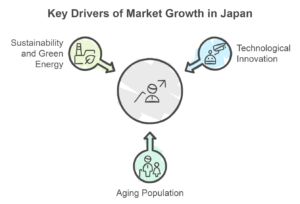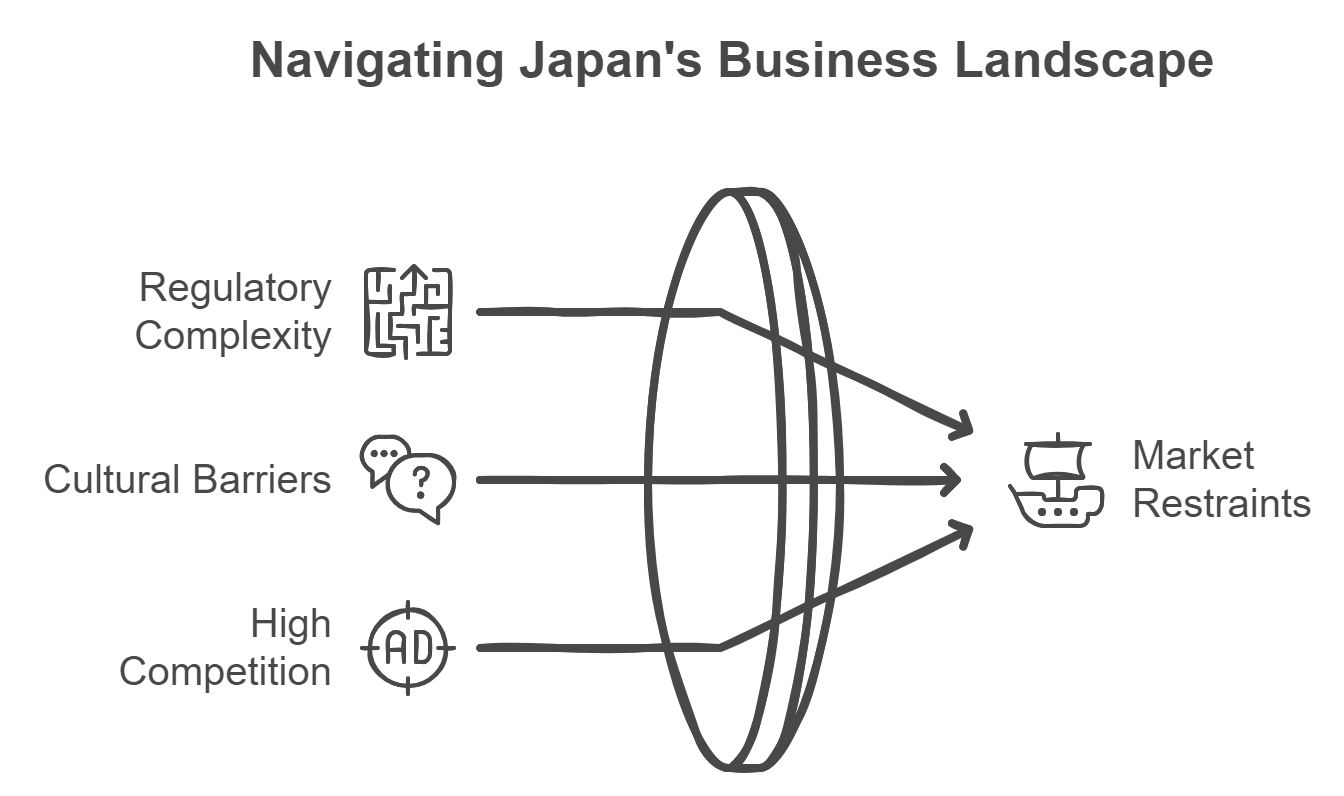Marktonderzoek in Japan

With detailed market research in Japan, companies can uncover market gaps, understand the competitive landscape, and craft strategies that ensure long-term success in this highly sophisticated market.
Japan’s market is one of the most developed and innovative in the world, offering significant opportunities across multiple sectors. For this reason, conducting market research in Japan is critical for businesses to understand the complexities of this market and stay ahead of the competition.
What Is Market Research in Japan?
Market research in Japan allows companies to identify key market trends, consumer preferences, and potential challenges in this market. Through this research, businesses can solve critical issues such as understanding local consumer behavior, navigating Japan’s intricate regulatory environment, and analyzing the competitive landscape.
Why Do Businesses Need Market Research in Japan?
One key reason businesses require market research in Japan is to tailor their products and services to meet the unique preferences of Japanese consumers. Japanese consumers are known for their high expectations in terms of quality, service, and innovation. Without a clear understanding of these consumer demands, businesses risk developing offerings that do not resonate with the local market.
Additionally, market research in Japan helps businesses comply with the country’s regulatory requirements, which can be complex for foreign companies. From understanding local business practices to navigating tax laws and industry-specific regulations, market research ensures that businesses remain compliant and avoid costly legal complications.
What Are the Benefits of Market Research in Japan?
Market research in Japan offers numerous advantages for businesses aiming to thrive in this highly competitive and sophisticated market. Here are key benefits businesses gain through detailed market analysis:
- Geïnformeerde besluitvorming: By conducting market research in Japan, businesses can make data-driven decisions regarding product development, market entry strategies, and investment, ensuring they align with local market needs.
- Inzicht in consumentenvoorkeuren: Japanese consumers are known for their distinct preferences and high standards. Market research helps businesses understand these preferences, enabling them to customize their offerings to meet local expectations.
- Identificeren van marktkloven: Market research in Japan uncovers unmet needs and untapped opportunities, allowing businesses to introduce innovative products or services that fill gaps in the market.
- Verbeterde concurrentiekracht: With insights into competitor strategies and market trends, businesses can position themselves more effectively and gain a competitive edge in Japan’s demanding market.
- Risicobeperking: Market research in Japan reduces the risk of market entry failure by providing crucial insights into regulatory requirements, consumer trends, and industry dynamics, helping businesses avoid costly missteps.
Onze huidige marktbeoordeling en aanbevelingen
We recommend that businesses focus on sectors such as consumer electronics, luxury goods, and healthcare services, which continue to see growth due to Japan’s aging population and demand for high-quality products. We believe that localization of products and marketing strategies is critical for success in this market, as Japanese consumers value cultural relevance and tailored experiences.
Additionally, we consider the regulatory landscape in Japan to be a significant factor for businesses entering the market. Market research in Japan reveals the importance of understanding local regulations and business practices to ensure smooth market entry and long-term sustainability. Businesses that take the time to comply with local laws and adapt to Japan’s unique consumer preferences will have the greatest chances of success.
The Importance of Japanese Culture

Many foreign companies have found it hard to overcome unique business barriers. The Japanese language has a lot of nuances and has to be interpreted with sets of other criteria such as facial expressions, gestures, and the previous context. Japanese businesspeople effectively switch their standing point (Honne and Tatemae) according to business situations. Outsiders may become confused about what they really want to say. Face-to-face communication is very revered in Japanese business settings. People tend to favor an ever-lasting constructive relationship through a sequence of dialogues.
Key Industries in Japan
Japan’s economy is diverse, with opportunities across a wide range of industries. Here are some of the most significant industries shaping Japan’s market landscape:
- Automobiel: Japan is home to some of the world’s leading car manufacturers, such as Toyota, Honda, and Nissan. This industry continues to thrive due to innovation in electric vehicles and hybrid technology.
- Technology and Electronics: Japan is a global leader in consumer electronics and advanced technology, with companies like Sony, Panasonic, and Toshiba driving innovation in areas such as robotics, AI, and smart devices.
- Gezondheidszorg: Japan’s aging population creates significant demand for healthcare services, pharmaceuticals, and medical technology, providing opportunities for companies in the healthcare sector.
- Farmaceutica: The pharmaceutical industry is booming, with companies like Takeda Pharmaceutical leading the way in drug development and innovation in healthcare products.
- Detailhandel: Japan’s retail industry is vast, with demand for both luxury and everyday consumer goods. Companies such as Uniqlo and Muji exemplify the success of Japanese brands both domestically and globally.
- Finance and Insurance: The financial services industry is essential in Japan, with major banks such as Mitsubishi UFJ Financial Group and insurers like Nippon Life Insurance leading the market.
- Energy and Renewable Resources: Japan is focusing on reducing its reliance on fossil fuels, which is leading to increased opportunities in renewable energy, especially solar, wind, and nuclear energy.
- Toerisme: Despite challenges from the global pandemic, Japan’s tourism industry remains strong, with attractions such as Kyoto, Mount Fuji, and Tokyo drawing millions of tourists annually.
- Food and Beverages: Japan’s unique cuisine and beverage industry, including companies like Suntory and Asahi, provide substantial export and domestic market opportunities.
- Logistiek en transport: Japan’s well-developed infrastructure and efficient transportation system support industries ranging from automotive to retail, with logistics giants like Yamato Holdings playing a key role.
Main Tourist Attractions in Japan

Japan is renowned for its rich cultural heritage, stunning landscapes, and vibrant cities, making it a top destination for tourists from around the world. Businesses in the tourism and hospitality sector can benefit greatly from market research in Japan and capitalize on these opportunities.
- Mount Fuji: This famous site attracts millions of tourists each year for hiking, photography, and sightseeing. Travel and hospitality businesses can use market research in Japan to develop services tailored to these visitors.
- Kyoto: Known for its beautiful temples, traditional tea houses, and historic districts, Kyoto is a top destination for cultural tourism. Through market research in Japan, businesses can identify ways to cater to both international and domestic tourists looking for authentic Japanese experiences.
- Tokio: As the bustling capital city, Tokyo is a hub for business, entertainment, and shopping. From Shibuya Crossing to the Imperial Palace, tourists flock to Tokyo for its modern attractions and vibrant nightlife. Companies can leverage market research in Japan to create innovative offerings that appeal to the diverse needs of tourists visiting Tokyo.
Key barriers to understanding Japanese business

- The Japanese language has great nuance.
- A complex system of facial expressions, gestures, and social context accompanies language.
- Nuanced system of body language and standing postures.
- Face-to-face communication is highly valued.
- Face-to-face dialogues reinforce lasting business relationships.
- To master the Japanese market, you must first adapt to cultural practices.
About Market Research in Japan
A market research firm in Japan will better help your business explore it’s consumer markets. As a market research firm in Japan, SIS International has 40 years of experience tapping into global markets from North America and Europe to Asia, Africa, and the Middle East. Our experienced teams of market researchers are highly educated and trained in the industries we study, and many staff members are bilingual or speak multiple world languages. We have a dedicated team specifically of native Japanese speakers who intimately understand the target market and have the cultural background and knowledge to access respondents from the Japanese consumer base. Accessing this consumer base is an incredible challenge for international business; at SIS, we seamlessly integrate a keen understanding of language, culture, and business to better understand the needs of growing Asian markets and put their opinions and insights to work for your business.
Over SIS Internationaal
SIS Internationaal biedt kwantitatief, kwalitatief en strategisch onderzoek. Wij bieden data, tools, strategieën, rapporten en inzichten voor besluitvorming. Wij voeren ook interviews, enquêtes, focusgroepen en andere marktonderzoeksmethoden en -benaderingen uit. Neem contact met ons op voor uw volgende marktonderzoeksproject.





